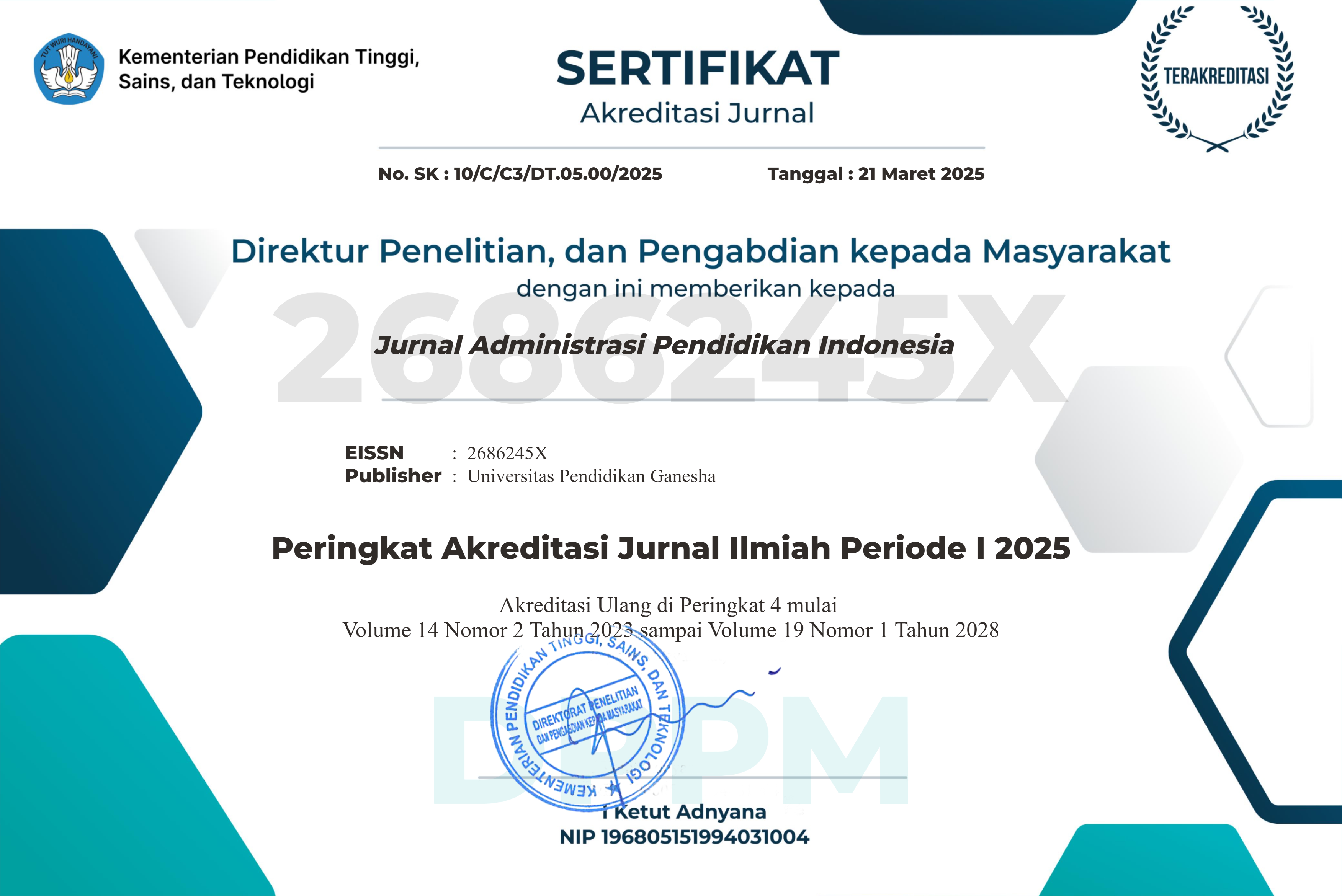The Effect of Project-Based E-Learning Against Critical Thinking Skills and Science Learning Achievement of Class X Students
DOI:
https://doi.org/10.23887/jurnal_ap.v14i1.1849Keywords:
project based E-Learning, critical thinking, learning achievementAbstract
The purpose of this study was to determine the effect of the project-based e-Learning learning model on critical thinking skills and science achievement. This research has a quasi-experimental design. The population of this study was class X SMK Negeri 1 Tembuku for the 2022–2023 academic year, consisting of 10 classes (259 students). The research sample was taken using the random sampling technique; two classes were determined as samples and divided into two groups, namely the experimental group and the control group. Critical thinking skills data was collected with an essay test, and in science, learning achievement data was collected with an expanded multiple-choice test. Data analysis used the one-way MANCOVA statistical test with a significance level of 5% and continued with the LSD test. The results showed that (1) There are differences in critical thinking skills and learning achievement in science between students who learned with the PjBeL model and students who learned with the DEL model. (2) There are differences in critical thinking skills between students who learned with the PjBeL model and students learning with the DEL model. (3) There are differences in science learning achievement between students who learned with the PjBeL model and students learning with the DEL model. Based on the results of the study, it can be concluded that the PjBeL model influences students' critical thinking skills and learning achievement in science in Class X SMKN 1 Tembuku.
References
Agung, A. A. G. (2018). Metode Penelitian Kuantitatif (Perspektif Manajemen Pendidikan). Universitas Pendidikan Ganesha.
Agustini, K., Santyasa, I. W., & Ratminingsih, N. M. (2019). Analysis of competence on “tpack”: 21st century teacher professional development. Journal of Physics: Conference Series, 2(1), 1–9. https://iopscience.iop.org/article/10.1088/1742-6596/1387/1/01203 5/meta
Brown-Martin, G. (2017). Education and the fourth industrial revolution. Group Media. https://www.groupemediatfo.org/ wpcontent /uploads /2017/12/final-Education-and-the-Fourth-Industrial-Revolution-1-1-1.pdf
Chaeruman, U. A. (2017). Pedati-model desain sistem pembelajaran blended. panduan merancang mata kuliah daring spada indonesia. Direktorat Pembelajaran, Dirjen Pembelajaran dan Kemahasiswaan, Kemenristekdikti.
Danial, M., & Sulastri, T. (2019). Hubungan antara keterampilan berpikir kritis dan metakognisi dengan penguasaan konsep pada beberapa model pembelajaran IPAS. Prosiding Seminar Nasional Lembaga Penelitian Universitas Negeri Makassar. https://ojs.unm.ac.id/ semnaslemlit/article/viewFile /8255/4766.
Undang-undang RI Tentang Sistem Pendidikan Nasional, Pub. L. No. 20 tahun 2003 (2003).
Ennis, R. H. (1996). Critical thinking. USA: University of Illionis.
Experenza, P., Isnaini, M., & Irmita, L. (2019). Pengaruh model pembelajaran think pair share terhadap keterampilan berkomunikasi siswa pada larutan elektrolit dan non elektrolit. Jurnal Pendidikan IPAS, 3(1), 81–93. http://jurnal.radenfatah.ac.id/index. php/orbital/article/view/3370
Febrianita, N. K. I. (2019). Keefektifan blanded learning berbasis project dan gaya belajar terhadap keterampilan berpikir kritis dalam pembelajaran dasar desain grafis pada siswa smk. Tesis. Tidak diterbitkan. Singaraja: Program Pascasarjana Universitas Pendidikan Ganesha.
Ihsan, M. S., Ramdani, A., & Saprizal, H. (2019). PENGEMBANGAN E-LEARNING PADA PEMBELAJARAN KIMIA UNTUKMENINGKATKAN KEMAMPUAN BERPIKIR KRITIS PESERTA DIDIK. Jurnal Pijar MIPA, 14(2), 84–87. https://jurnalfkip.unram.ac.id/ index.php/JPM/article/view/1238/pdf
Ihsana. (2017). Belajar dan Pembelajaran. Yogyakarta: Pustaka Pelajar.
Mahasneh, A. M., & Alwan, A. F. (2018). The effect of project-based learning on student teacher self-efficacy and achievement. International Journal of Instruction, 11(3), 511–524. https://eric.ed.gov/?id=EJ1183424
Naidu, S. (2006). E-learning: A guidebook of principles, procedures, and practices (revision editioni, 2006). New delhi: Commonwealth Educational Media Center.
Putra, G. P. A. (2017). Pengaruh model pembelajaran berbasis projek terhadap hasil belajar animasi tiga dimensi ditinjau dari kecerdasan spasial siswa kelas xi smk negeri 1 sukawati. Tesis. Tidak diterbitkan. Singaraja: Program Pascasarjana Universitas Pendidikan Ganesha.
Putri, I. N. A., Fadiawatia, N., & Syamsuria, M. M. F. (2019). Using projects-based learning in improving students’ critical thinking skills to recycle waste cooking oil. International Journal of Chemistry Education Research, 3(1), 23–28. https://journal.uii.ac.id/IJCER /article/download/12747/pdf
Rais, M. (2010). Project-Based Learning:Inovasi Pembelajaran yang Berorientasi Soft Skills. Jurnal Pendidikan, 5(4), 1–10. https://adoc.pub/download/project-based-learning-inovasi-pembelajaran-yang-berorientas587d0516bbf764be04da611fd1d650f867278. html
Rajan, K. P., Gopanna, A., & Thomas, S. P. (2019). A project based learning (pbl) approach involving pet recycling in chemical engineering education. Recycling, 4(10), 1–16. https://www.mdpi.com/2313-4321/4/1/10
Rusman. (2012). Belajar dan pembelajaran berbasis komputer. Bandung: Alfabeta.
Santyasa, I. W., Rapi, N. K., & Sara, I. W. W. (2020). Project based learning and academic procrastination of students in learning physics. International Journal of Instruction, 13(1), 489–508. https://eric.ed.gov/?id=EJ1239269
Sunarjaya, I. P. K. (2019). Pengaruh metode project based learning dan kemampuan berpikir kritis terhadap kemampuan menulis teks diskripsi pada siswa kelas vii smp negeri 10 denpasar. Sunarjaya, I P. K.
Syah, M. (1995). Psikologi pendidikan. Bandung: PT. Remaja Rosda Karya.
Thomas, J. W. (2000). A review of research on project-based learning. PBL Research. http://www.bobpearlman.org/ BestPractices/PBL_Research.pdf.
Widyaningsih, S. W., & Yusuf, I. (2019). Implementation of project-based learning (pjbl) assisted by e-learning through lesson study activities to improve the quality of learning in physics learning planning courses. International Journal of Higher Education, 9(1), 60–68. https://www.googleadservices.com/pagead/aclk?sa=L&ai=DChcSEwil-NzltdD8AhVOKysKHYJOArAYABABGgJzZg&ohost=www.google.com&cid=CAESbeD2uF9M5vx2v88ijK-2rYDLkXu751U0vq_dsKDm18LegzZOBSoYvfYGzP885Y_F5I17leIl whpE1g5YrC_2VikgLO1xgonjn9jW6eLgDZCmOFBfm4n-LAnMYot 2QMgL2sM9QLOLkdX8k9a7Pw&sig=AOD64_2P2wQ5qeoct1LAywsPaReZR1t8oQ&q&adurl&ved=2ahUKEwiC2NXltdD8AhW4cGwGHZzPBNgQ0Qx6BAgIEAE
Wulandari, A. S., N., S. I., & Latria Devi, N. L. P. L. (2019). Pengaruh model pembelajaran berbasis proyek terhadap kreativitas siswa smp pada pembelajaran ipa. Jurnal Pendidikan Dan Pembelajaran Sains Indonesia, 1(1), 97–108. https://ejournal. undiksha.ac.id/index.php/JPPSI/article/view/17222
Yao, J., Sun, H., Tian, Y., & Gu, H. (2019). Project-based learning in chinese middle-school students is more effective than the traditional teaching method: An experimental study. SIEF, 2(2), 115–121. https://papers.ssrn.com/sol3/papers.cfm?abstract_id=3388240











